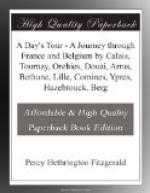Now begin to flit past us signs unmistakable of an approaching fortified town. Here are significant green banks and mounds cut to angles and geometrical patterns, soft and enticing, enriched with luxuriant trees, but treacherous—smiling on the confiding houses and gardens which one day may be levelled at a few hours’ notice. Next come compact masses of Vauban brick, ripe and ruddy, of beautiful, smooth workmanship; stately military gateways and drawbridges, with a patch of red trousering—a soldier on his fat Normandy ‘punch’ ambling lazily over; and the peaceful cart with its Flemish horses. The brick-work is sliced through, as with a cheese-knife, to admit the railway, giving a complete section of the work. We are, in short, at one of the great places fortes of France, Douai, where the curious traveller had best avoid sketching, or taking notes—a serious offence. Here I lingered pleasantly for nearly three hours, and, having duly breakfasted, noted its air of snug comfort and prosperity. There is here a famous arsenal—ever busy—one of the most important in France, and it has besides some welcome bits of artistic architecture.
It was when wandering down a darkish street, that I came on a most original building, the old Mairie, enriched with a belfry of delightfully graceful pattern. It might be a problem how to combine a bell-tower with offices for municipal work, and we know in our land how such a ‘job’ would be carried out by ‘the architect to the Board.’ But all over Flemish France and Belgium proper we find an inexhaustible fancy and fertility in such designs. It is always difficult to describe architectural beauties. This had its tower in the centre, flanked by two short wings. Everything was original—the disposition of the windows, the air of space and largeness. Yet the whole was small, I note that in all these Flemish bell-towers, the topmost portion invariably develops into something charmingly fantastic, into cupolas and short, little galleries and lanterns superimposed, the mixture of solidity and airiness being astonishing. It is appropriate and fitting that this grace should attend on what are the sweetest musical instruments conceivable. Mr. Haweis, who is the poet of Flemish bells, has let us into the secret. ’The fragment of aerial music,’ he tells us, ’which floats like a heavenly sigh over the Belgian city and dies away every few minutes, seems to set all life and time to celestial music. It is full of sweet harmonies, and can be played in pianoforte score, treble and bass. After a week in a Belgian town, time seems dull without the music in the air that mingled so sweetly with all waking moods without disturbing them, and stole into our dreams without troubling our sleep. I do not say that such carillons would be a success in London. In Belgium the towers are high above the towns—Antwerp, Mechlin, Bruges—and partially isolated. The sound falls softly, and the population is not so dense




